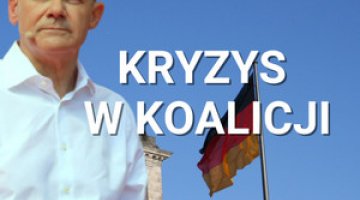The debt brake is back: the German government presents a draft budget
After weeks of negotiations, the government coalition has reached a compromise on the draft budget for 2024. On 5 July, a 1364-page document was signed estimating that spending will reach €445.7 billion, and the new debt will stand at €16.6 billion. This is significantly less not only compared to the record ‘COVID’ year, when €573 billion were spent, but also to the assumptions of the financial plan for 2023.
The austerity policy will allow the so-called debt brake to be restored to full effect. It is a fiscal rule recorded in the constitution stating that the permissible ceiling of the structural budget deficit, thus independent of economic fluctuations, is the equivalent of 0.35% of GDP. The brake was suspended in 2020 due to the need to increase spending to fight the post-pandemic crisis.
The bill is to be discussed by the Bundestag within the next few weeks. Assuming that the compromise holds, the necessary legislative work should be completed in early autumn.
Commentary
- Reaching the compromise over the draft budget within the coalition was a long process and involved complicated negotiations between the ministries. Chancellor Olaf Scholz also had to become involved in the final stage. However, it was not surprising that so many difficulties arose: the change of course imposed by the author of the project, finance minister Christian Lindner (FDP), means a shift in spending priorities and has disturbed the fragile balance between the co-governing parties; the Greens especially have come off worst in this respect. At the same time, according to representatives of the SPD and the Greens, resorting to austerity during recession while facing huge demand for public investments may further escalate the problems the German economy is facing. The coalition partners also fear that cutting the budget will strengthen the opposition, especially the anti-establishment Alternative for Germany (AfD), which has already overtaken the Social Democrats in the polls.
- The finance minister’s main aim was to reverse the expansionary fiscal policy of the last three years and to bring back the debt brake. His party, the FDP, have long criticised the increase in public spending, seeing it as a source of distortion of market competition and the expansion of state interventionism, and a cause of rising inflation. It is expected that the stabilisation of public finances will allow the corporate tax burden to be lifted to some extent; the FDP assumes that this in turn will contribute to the revival of private investment.
- The high tax revenues, which have risen mainly due to inflation, have helped Lindner achieve his goal. As a result, the spending cuts will not exceed €20 billion, including only €3.5 billion in direct cuts in the ministerial portfolios. Other measures have had a greater impact; one of them is the dissolution of the special digital infrastructure fund and the transfer of its €4.8 billion to the federal budget, which has automatically improved the balance. In addition to this, billions of euros will be saved as a result of subsidy cuts. The existence of extra-budgetary expenditures, such as the €180 billion Climate and Transformation Fund (Klima- und Transformationsfond, KTF) and the €100 billion fund for the Bundeswehr has also created more room for the Ministry of Finance to manoeuvre.
- The Ministry of Transport and Digital Infrastructure, led by Lindner’s party colleague Volker Wissing, is among the main winners of the budget negotiations. It will have €38.7 billion at its disposal, almost 9% more than this year, mainly because climate protection policy has a high priority. Its projected expenditure will now increase, mainly due to the allocation of €15 billion for the development of the railway system, which in recent years has been criticised for the deteriorating condition of its infrastructure. Wissing can also plan new infrastructure projects thanks to the rising revenues from truck tolls, funds from emissions permits and support from the KTF.
- The situation of the Ministry of Defence is more difficult to assess. Given the war in Ukraine and the increasingly serious security challenges in this area, there should be a significant and sustained increase in spending. This ministry, led by Boris Pistorius (SPD), will receive €51.8 billion next year, €1.7 billion more than in 2023. However, the greater part of this sum will be used to compensate for the pay raises in the public sector. The ministry insisted that its budget should be increased by €10 billion, but Ministry of Finance did not approve this. Defence spending will be supported from a special fund of €100 billion which was created last year. This will make it possible to implement additional contracts worth €19 billion in 2024, and to meet (at least at the level of declarations) the NATO commitment to spend 2% of GDP on defence. However, these funds will run out in the coming years, and it is unclear whether it will be possible to keep defence funding at the level required by the Alliance on a regular basis.
- The Ministry of Health is one of the greatest losers of the political battle over the budget. Healthcare finances, which were a priority in recent years due to the pandemic, have been cut by a third, from €24.6 billion to €16.2 billion. For example, federal subsidies for nursing care insurance and statutory health insurance have been cut, which is likely to cause a raise in contributions for both employees and employers. The Ministry for Family Affairs, controlled by the Greens, has also found itself in a difficult situation. A great deal of controversy has been provoked by the reduction of the family benefit budget, by excluding parents whose total annual income exceeds €150,000 before tax (this is the amount of gross remuneration less free amounts, tax deductible costs, etc.) from the group of beneficiaries. Lindner claims that lowering the previous €300,000 threshold is a solution which will help to redistribute income more fairly. However, critics see it as another blow to the middle class, which has already suffered heavily as a result of the pandemic, inflation and the economic slump. The ministry has also been forced to accept cuts in funds for basic child benefit. This will affect the flagship project of Minister Lisa Paus from the Greens, who intended to integrate all child benefits under one institutional roof. The ministry will receive only €2 billion for this purpose instead of the €12 billion it requested.
- The reduction of the budget plan for the Ministry of Foreign Affairs from €7.4 billion to €5.3 billion over the next two years is proof of the Greens’ weakening political position in the coalition. Unless these figures change over the course of further negotiations, the talk about the failure of Annalena Baerbock, who is in charge of the ministry, will be justified. Vice-Chancellor Robert Habeck was likewise unable to count on preferential treatment. The Ministry for Economic Affairs and Climate Action, which he heads, has retained the politically important funding for improving the regional economic structure and competitiveness, and has managed to push through a deal on subsidies for foreign investments which will be funded by the KTF, not the federal budget (this includes €10 billion in subsidies for Intel to build a semiconductor factory in Magdeburg). However, considering the whole budget of this ministry, it is impossible not to notice the sharp cuts, from €14.5 billion to €11 billion.
- Lindner’s push for the Sparhaushalt (austerity budget) also has a European dimension. Negotiations are currently underway to reform the Stability and Growth Pact, which sets out the rules for fiscal discipline in the European Union. The southern European countries and France are insisting on loosening the rules so they can more easily finance investment expenditures and flexibly plan paths to reduce excessive debt. These countries have recently been supported by the European Commission, which has proposed a package of far-reaching changes to the pact. However, Germany is standing in the way of these reforms, insisting that the 3% deficit cap and the 60% public debt limit be maintained, and that the fiscal expansion which started during the pandemic be discontinued as soon as possible. For this reason Lindner is resuming the modus operandi of his predecessors: promoting prudent fiscal policy in the EU and striving for a ‘black zero’ in the member states’ budgets.





